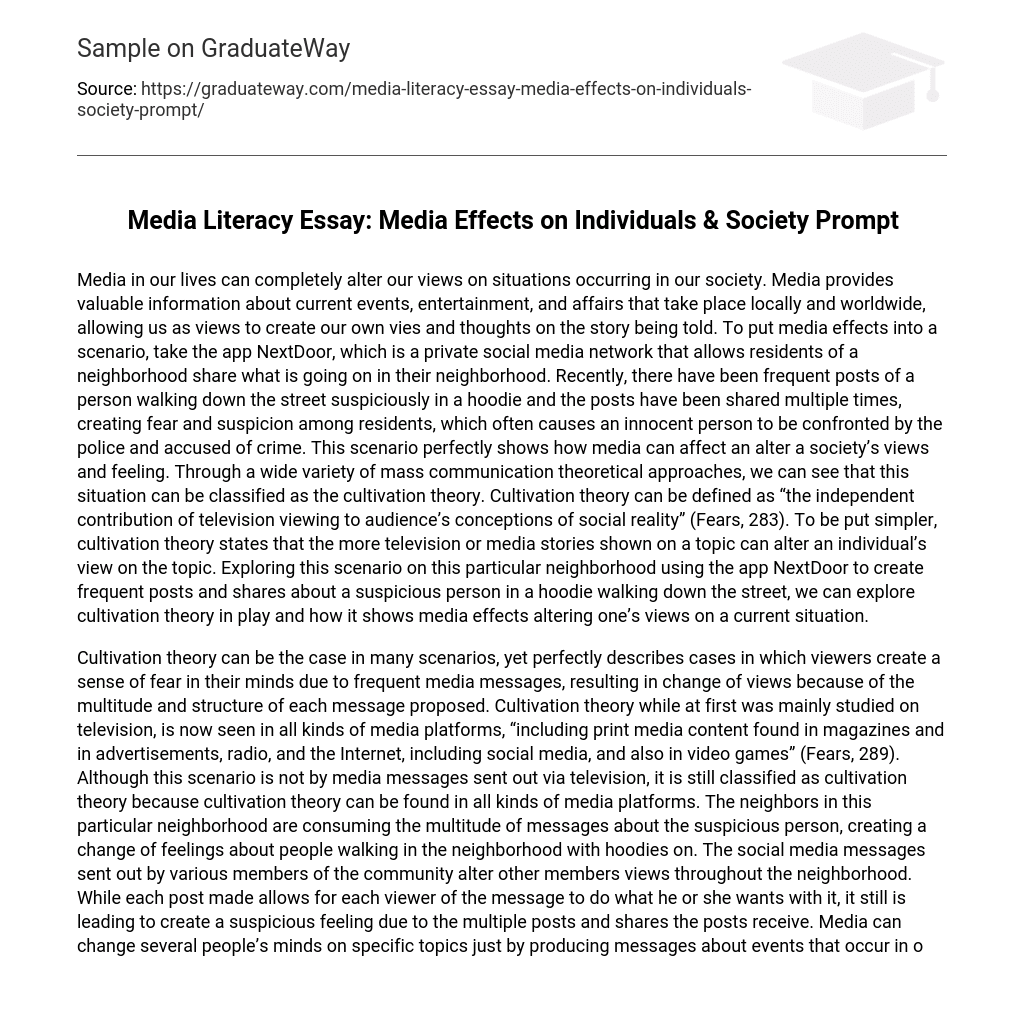Media in our lives can completely alter our views on situations occurring in our society. Media provides valuable information about current events, entertainment, and affairs that take place locally and worldwide, allowing us as views to create our own vies and thoughts on the story being told. To put media effects into a scenario, take the app NextDoor, which is a private social media network that allows residents of a neighborhood share what is going on in their neighborhood. Recently, there have been frequent posts of a person walking down the street suspiciously in a hoodie and the posts have been shared multiple times, creating fear and suspicion among residents, which often causes an innocent person to be confronted by the police and accused of crime. This scenario perfectly shows how media can affect an alter a society’s views and feeling. Through a wide variety of mass communication theoretical approaches, we can see that this situation can be classified as the cultivation theory. Cultivation theory can be defined as “the independent contribution of television viewing to audience’s conceptions of social reality” (Fears, 283). To be put simpler, cultivation theory states that the more television or media stories shown on a topic can alter an individual’s view on the topic. Exploring this scenario on this particular neighborhood using the app NextDoor to create frequent posts and shares about a suspicious person in a hoodie walking down the street, we can explore cultivation theory in play and how it shows media effects altering one’s views on a current situation.
Cultivation theory can be the case in many scenarios, yet perfectly describes cases in which viewers create a sense of fear in their minds due to frequent media messages, resulting in change of views because of the multitude and structure of each message proposed. Cultivation theory while at first was mainly studied on television, is now seen in all kinds of media platforms, “including print media content found in magazines and in advertisements, radio, and the Internet, including social media, and also in video games” (Fears, 289). Although this scenario is not by media messages sent out via television, it is still classified as cultivation theory because cultivation theory can be found in all kinds of media platforms. The neighbors in this particular neighborhood are consuming the multitude of messages about the suspicious person, creating a change of feelings about people walking in the neighborhood with hoodies on. The social media messages sent out by various members of the community alter other members views throughout the neighborhood. While each post made allows for each viewer of the message to do what he or she wants with it, it still is leading to create a suspicious feeling due to the multiple posts and shares the posts receive. Media can change several people’s minds on specific topics just by producing messages about events that occur in our everyday lives, being one of the leading reasons as to why journalism is so important in our lives. It creates different views throughout our world, and without different views our world would not have different cultures, views, or opposing thoughts. With cultivation theory in a society, however, it creates a sense of similarity, changing views of those in a community to share a similar view or feeling. Cultivation theory “explores the effect of recurrent images of violence, gender roles, race and ethnicity, occupations, and a host of stereotypical images portrayed on the ubiquitous media on the perceptions of […] viewers over time” (Fears, 284). The recurrent messages on the app NextDoor affects neighbors in a particular neighborhood by causing them to develop suspicious feelings about possibly an innocent person walking through the neighborhood in a hoodie.
Cultivation theory explains why individuals have the thoughts and feelings that they do, as well as explains the way individuals perceive messages mass media produces for society. The app NextDoor affected residents views in a particular neighborhood just by their own fingertips on their smartphones, proving media is extremely powerful in our daily lives and can alter our views in the click of a button. With mass media being so important in our day-to-day lives, cultivation theory has proved to show that it molds one’s takeaways from media messages, just as it did to the members of the neighborhood receiving messages of “suspicious activity” on the app NextDoor.
References
- Fears, L. M. (0AD). D Cultivation Theory, Social Cognitive Theory, & Third Person Effects. Retrieved September 26, 2019, from https://astate.grtep.com/index.cfm/masscomm/page/spiralofsilence.





